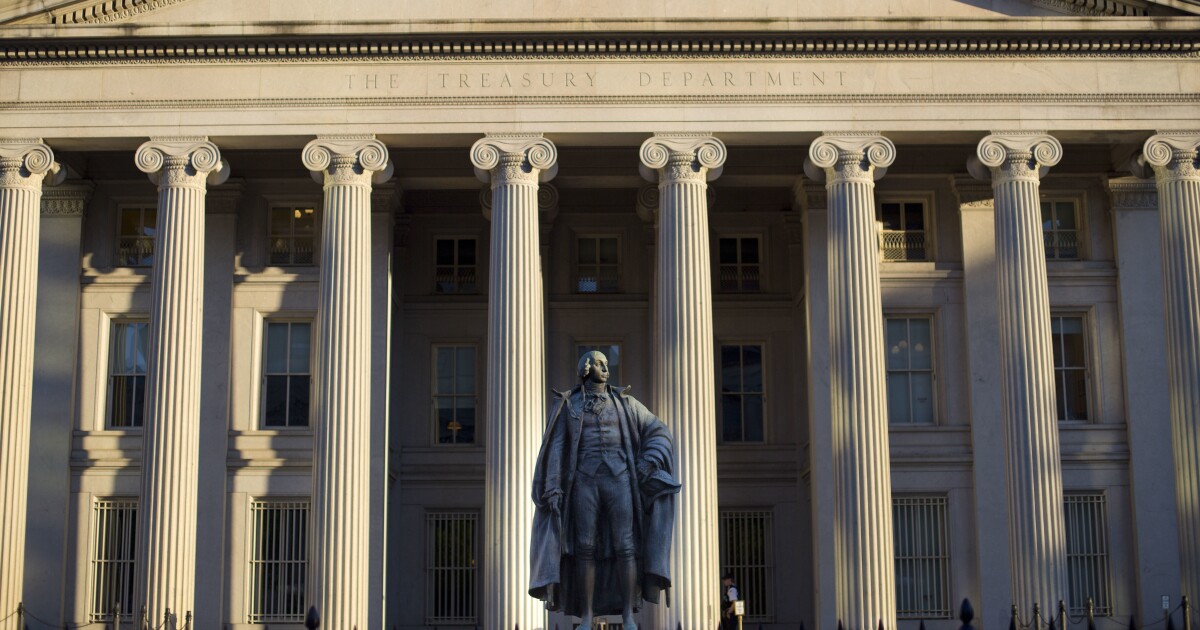

Lawmakers on Capitol Hill are gearing up for a political showdown over raising the country’s $31.4 trillion borrowing limit this coming spring or summer after punting the issue to a new Congress
.
Republicans will take control of the House in January, setting up a clash that could have major economic implications.
FISCAL DOOM: FIVE WAYS THE $31 TRILLION NATIONAL DEBT THREATENS THE ECONOMY
Some Democrats had urged their leadership to take action to raise the borrowing limit during the lame-duck session of Congress while they had unified control of both chambers. But congressional leaders ran out of time and abandoned the idea, focusing instead on negotiating a sprawling government funding package
. Republicans in both the House and the Senate are expected to use the nation’s debt ceiling as leverage to push policy changes, setting off a standoff that could shake global markets.
“We had a resolution in the last Congress, any increase in the debt ceiling would have to be accompanied by some manner of fiscal controls,” Sen. Ron Johnson (R-WI) said to reporters after leading a GOP conference meeting in mid-December in an effort to persuade fellow Republicans to hone in on fiscal conservatism.
Johnson, who often portrays himself as a deficit hawk, said he made the case for needing to rein in government spending and told reporters his fight has only just begun, foreshadowing the looming debt ceiling showdown to come in the new year.
“We talked about using that moment of leverage in the way that it was meant to be used. The whole purpose of the debt ceiling was, should you have to increase it because of deficit spending, that you’d be forced to do some kind of fiscal controls in exchange for what most people don’t want to vote for,” he said.
Democrats and the Biden administration have said they intend to stand firm and won’t allow Republicans to pressure them to cut federal programs.
“We’re not negotiating. We’re giving them nothing,” said Sen. Chris Murphy (D-CT) to the
Wall Street Journal
. “It is their responsibility as members of Congress to pay the bills of the federal government just like they pay their bills for their home.”
Both parties agreed to debt limit hikes three times under Former Republican President Donald Trump
. But Republicans blame high inflation on spending during President Joe Biden
’s first two years.
The debt ceiling increase is a must-pass item awaiting the new Congress, something many Republicans, especially in the House, see as critical leverage. House GOP Leader Kevin McCarthy (R-CA), who is in the middle of a battle to become House speaker, may be beholden to members of the very conservative Freedom Caucus
, who have suggested debt ceiling increases must be tied to substantial cuts to domestic spending and potential reductions to Social Security and Medicare
. Several GOP members have said they would oppose raising the debt ceiling, even if all their demands are met.
In an interview with
Punchbowl News
ahead of the election, McCarthy said spending cuts would be necessary in order to raise the nation’s borrowing limit. “You can’t just continue down the path to keep spending and adding to the debt,” he said.
The debate is set to become one of McCarthy’s most difficult challenges if he is elected speaker. The California Republican would be forced to work with Biden and Senate Democrats to come to an agreement without upsetting his right flank.
At a press conference last week, Senate Majority Leader Chuck Schumer (D-NY) said raising the debt limit must be done in a bipartisan way, refusing to elaborate on how negotiations will go in the new Congress under a divided government.
“I think that it’s too early to judge what’s going to happen in the House. There’s so much discombobulation and disunity on different sides of the Republican caucus,” Schumer said. “I’ve always gotten along with Kevin McCarthy. You know, we don’t agree on a whole lot of issues, but I try to work with anyone I can to get things done for the American people.”
The federal debt is likely to reach its statutory limit of nearly $31.4 trillion sometime in early 2023. When the government hits the limit, Treasury Secretary Janet Yellen will be able to stave off default for a couple of months, utilizing so-called extraordinary measures such as withholding scheduled contributions to a federal employee’s retirement funds in order to utilize the funds to pay off the debt. Eventually, those options will run out, and if the nation’s borrowing limit is not increased, it could lead to a partial government shutdown and delays in government payments, including Social Security checks.
The recent threats from Republicans that they intend to use any vote on raising the debt limit as a way to force Democrats to cut spending echoes a similar standoff in 2011
. Congressional Republicans sought to pressure then-
President Barack Obama to accept spending cuts in exchange for raising the debt limit. Fears of government default rocked the financial markets and led to an unprecedented downgrade of the nation’s credit rating. Ultimately, this forced a last-minute deal between the two parties.
In an interview with
Yahoo Finance
, White House chief economist Jared Bernstein warned Republicans against using the nation’s borrowing limit as a negotiating tool.
“It is always an absolute awful time to fool around with the debt ceiling the way Republicans have been talking about, but it’s even worse now,” he said. “We’ve been talking about an economy that’s in transition … headwinds, which are real. There are obviously risks of different landing scenarios. This is, this is just the absolute worst moment to contemplate one’s own goals, of which that would be a massive one,” he said in the Yahoo interview.
CLICK HERE TO READ MORE FROM THE WASHINGTON EXAMINER
Sen. John Thune (R-SD)
, the No. 2 Republican in the Senate, said it’s likely his members will insist on enacting budget reforms when they negotiate the limit on government borrowing next year. He pointed to the deal that was made in 2011, when Congress imposed limits on annual spending, enforceable through automatic budget cuts known as sequestration, that ultimately ended the debt-ceiling showdown. The agreement allowed the debt limit to be increased by $2.4 trillion two separate times, which ultimately saved $2 trillion over the course of 10 years.
“We’ve done things in the past around the debt limit increase that has been bipartisan. The Budget Control Act came out of that in 2011, as you all know, it put a restraint on federal spending,” Thune said to reporters on Capitol Hill last week. “We’ll see, we will cross that bridge when we come to it.”
Congress last raised the debt limit by $2.5 trillion last December. The Treasury Department has not specified when exactly the limit is expected to be reached in 2023.







